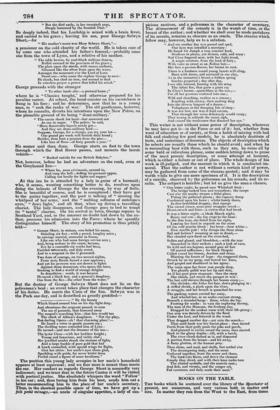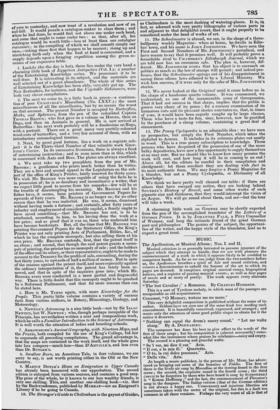BOOKS ON THE TABLE.
THE books which lie scattered over the library of the Spectator at present, are numerous, and very various both in matter an& size. In matter they run from the West to the East, from times of yore to yesterday, and now treat of a revolution and now of an 'ant-hill. It would puzzle a catalogue-maker to class them ; and when he had done, he would find not above one under each head, and some that ought to come under two : so that, after all, his catalogue would be .worth little—less at least . than our catalogue raisonnee; in the compiling of which we shall consult simply our ease,—taking those first that happen to be nearest; rising up and stretching forth only when the food at hand is consumed, and a supply depends upon a foraging expedition among the green re- cesses of our expansive table.
I. Luckily (for the day is hot), there lies under the very hand a charming little book of Eg,yptian Antiquities (Vol. I.); a number of the Entertaining Knowledge series. We pronounce it to be well done. It is interesting in its subject, and the materials are well selected out of a great abundance. The whole of this series of Entertaining Knowledge has been ably, very ably got up. The New Zealanders, for instance, and the Vegetable Substances, were both very clever compilations. 2. The next we come to, is a little book in green—a continua- tion of poor CoNsrABLE's Miscellany (No. LXXV.) ; the most miscellaneous of all the miscellanies, but by no means the worst on that account. The present Number is occupied by Butterflies, Moths, and Sphinxes, from the pen of the redoubted Captain THOMAS BROWN; who first gave us a volume on Horses, then on Dogs, and then on Animals in general. He is now arrived at Butterflies : his next work probably will be a duodecimo on Bugs, with a portrait. There are a great many very prettily-coloured wood-cuts of butterflies, and a very fair account of them, with an introductory entomological treatise.
3. Next, by great good fortune, lies a work on -a cognate sub- ject • it is the Thirty-third Nuinber of that valuable work GRIF- FITH'S Curier. In its successive livraisons, there is always a fund of entertaining instruction ; and in none more than in this, which is concerned with Ants and Bees. The plates are always excellent.
4. We next take up two pamphlets from the pen of Mr. BROOKE; a gentleman who prints much better than he writes. They are a first and second appeal to the Legislature on the sub- ject of the office of King's Printer, lately renewed for thirty years. We wish Mr. BaooKE was more capable of using the facts he is in possession of; he is so desultory and inconclusive a writer, that we expect little good to accrue from his remarks—few will be at the trouble of disentangling his meaning; Mr. BROOKE and his father have, it seems, been printers of Government Papers for upwards of forty years. Mr. BROOKE is no longer so; for no other reason than that he was underbid. He was, it seems, dismissed without having made a fortune ; and certainly, after forty years of industry and employment of considerable capital, a family ought to have saved somethina-'',—that Mr. BROOKE has not, is to be attributed, according to him, to his having done the work at a low price; and as proof that it was so, those who undersold him have become bankrupts. But, all the time that Mr: BROOKE was printing Government Papers for the Stationery Office, the King's Printer was not only printing Acts Of Parliament, Bibles, &c., of which he has the complete monopoly, but also selling them at his own price. Mr. BROOKE contends, first, that the patent itself is an abuse; and second, that though the said patent grants a mono- poly of printing, the printer has no monopoly of sale ; and the holders of the office and its salary, or their representative, ought to be made to account to the Treasury for the profits of sale, amounting, during the last thirty years, to upwards of.half a million of Money. But in spite of the reasons against the patent itself, and more especially against the ordinary interpretation of it, the patent has lately been re- newed, and that in spite of the inquiries gone into; which Mr. BROOKE avers were conducted in a most partial and disgraceful way. There is little doubt that this monopoly ought to be quashed by a Reformed Parliament, and that for more reasons than can be stated here.
5. Here is Mr. TIMBS again, with more Knowledge for the People. This pretty little volume contains a variety of curious facts from various authors, in Botany; Mineralogy, Geolooy, and Meteorology.
6. NEWTON'S Astronomy is a nice little book—not by Sir ISAAC NEWTON, but W. NEWTON; who, though perhaps incapable of the Principia, has nevertheless written a neat and 'conipendious work, which he calls a Familiar Introduction to the Science of Astronomy. it is well worth the attention of ladies and boarding-schools.
7. ARROWSMITH'S Ancient Geography, with Nineteen Maps, and the Praxis, both compiled for the use of King's College, bid fair to supersede all preceding compilations. The grand advantage is that the maps are contained in the work itielf, and the whole goes into less compass—much less—than D'Arivimds, and less even than Dr. BUTLER'S. • • 8. Swallow Barn, an American Tale, in four volumes, we are sorry to say, is not worth printing 'either in the Old or the New Country.
9. MARTIN DOYLE'S Hints on Emigration to Upper Canada has already been honoured with our approbation. The second edition is enlarged from various sources, and contains a good map. The price of the -whole, be it known to our less wealthy friends is only one shilling. This, mid' another one-shilling book—vu, that by the Backwoodsman, published by MuititAy—are an Emigrant's Library if he be going to Canada. 10. The Stranger's Guide to Cheltenham is the gayest of Guides, as Cheltenham is the most dashing of watering-places. It is, in, fact, so adorned with very pretty lithographs of various parts in and adjacent to that delightful resort, that it ought properly to be considered under the head of works of art.
11. The Schoolmaster is abroad, we see, in the shape of a three- halfpenny weekly Magazine : when at home, he dwells in Edin- bro' town, and his name is JOHN JOHNSTONE. We have seen the First and Second Numbers of Mr. JOHNSTONE'S periodical, and have reason to say that it promises well. It will probably prove a formidable rival to CHAMBERS'S Edinburgh Journal, which we are told now has an enormous sale. The plan is, however, dif- ferent. Mr. JOHNSTONE avows that his object is to encroach on politics as much as the law of stamps will permit; and indeed pro- fesses, that the Schoolmaster springs out of his disappointment in seeing these odious laws adhered to by a Liberal Ministry. We wish him success, if it were only for the sake of Mrs. JOHNSTONE'S stories.
12. We never looked at the Original until it came before us in the shape of a handsome quarto volume. It was commenced, we understand, as one of the innumerable army of threepennies. That it had not success in that shape, implies that the public is grown very chary of its pence ; for a cursory examination of its humorous cuts and its pleasant stories convinces us, that, in times of yore, it would have been eagerly caught up by large classes. Those who have a taste for fun, may, however, now be gratified by the purchase of a cheap volume, containing a great deal of amusement.
13. The Penny Cyclopedia is an admirable idea : we have seen no prospectus, but simply the First Number, which takes the alphabet to Acarus. It includes in its columns plates cut neatly in wood. This is a true penny subscription to knowledge. Those persons who have despaired of the possession of one of the more bulky depositories, have now a fine opportunity to supply themselves at an easy rate. But we should like to know how many pennies the work will cost, and how long it will be in coming to an end ? Above all, let the editors be careful in their compilation and abridgment: let them recollect they are dealing with fact in its most authentic form. We may forgive a Penny Magazine for a blunder, but not a Penny Cyclopaadia, or Dictionary of all Knowledge.
We think we have pretty well cleared our table: if there are others that have escaped our notice, they are lurking behind SOUTHEY'S History of Brazil, and some other works of such gigantic size and thickness, that they would intercept the vision of an Argus. We will go round about them, and see—but the tour will take a week.



























 Previous page
Previous page